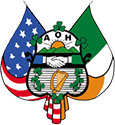Meriam-Webster defines a Hibernian:
(noun) of, relating to, or characteristic of Ireland or the Irish
First Known Use: 1632
Hibernia as a national personification representing Ireland appeared in numerous illustrations and drawings, especially in the nineteenth century.
Origins:
Hibernia is the Classical Latin name for the island of Ireland. The name Hibernia was taken from Greek geographical accounts. During his exploration of northwest Europe (c. 320 BC), Pytheas of Massilia called the island Ierne (written Ἰέρνη). Claudius Ptolemaeus (“Ptolemy”) called the island Iouernia (written Ἰουερνία) in his book Geographia (c. 150 AD). Iouernia was a Greek alteration of the Q-Celtic name *Īweriū from which eventually arose the Irish names Ériu and Éire. The original meaning of the name is thought to be “abundant land”.
It is likely that the Romans saw a connection between these historical names and the Latin word hibernus meaning wintry. In any case, the Roman historian Tacitus, in his book Agricola (c. 98 AD), uses the name Hibernia.
Today:
The Ancient Order of Hibernians is America’s oldest Irish Catholic Fraternal Organization founded concurrently in the coal-mining region of Pennsylvania and New York City in May,1836. Learn more about the history of our organization here
